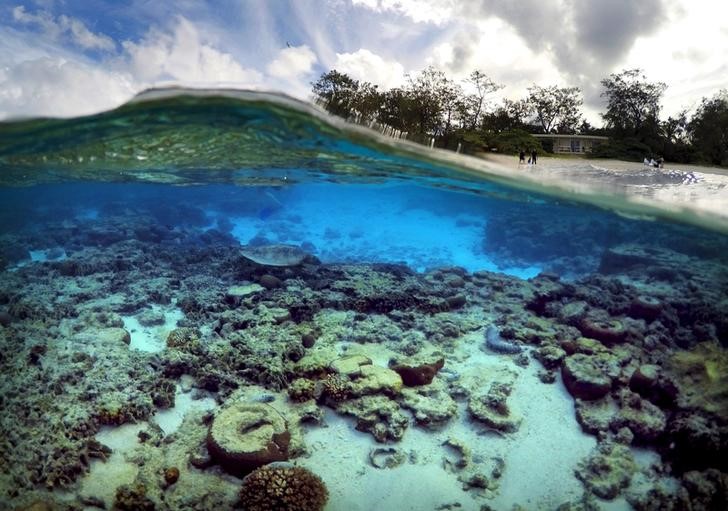Image: Tourists stand in front of huts that form part of the Lady Elliot Island Eco Resort where a turtle digs for food amongst the coral in the island’s lagoon, north-east of the town of Bundaberg in Queensland, Australia, June 9, 2015. REUTERS/David Gray
By Alister Doyle
OSLO (Reuters) – Some fish may cope with the changing chemistry of the oceans linked to global warming by permanently setting their body defenses to night-time levels, the time of day when they find sea water least hospitable, a study said on Monday.
Man-made carbon dioxide, released into the air by burning fossil fuels, forms a weak acid when mixed with water that can harm marine life in what is likely to be a worsening effect of global warming this century.
Fish adjust their bodies every day because levels of carbon dioxide naturally in the seas peak at night and dip during sunlight hours when algae, seaweed and other plants absorb carbon dioxide to generate energy.
The study of spiny damselfish, a small species from Australia’s Great Barrier Reef, found that those best able to tackle high carbon levels in the water produced offspring with flexible body clocks that helped adapt to acidification.
“It seems the tolerant offspring may have adjusted their circadian clocks as if it was always night,” Timothy Ravasi, one of the authors at King Abdullah University of Science and Technology in Saudi Arabia, wrote of the findings published in the journal Nature Climate Change.
The scientists reared the grey and white damsel fish in water with levels of carbon dioxide comparable to those predicted for coming decades and examined changes in genes and proteins in their brains.
Philip Munday, another of the authors at James Cook University in Australia, told Reuters the findings were “potentially good news” by pointing to ways that fish can adapt to acidification.
But he said the scientists needed more study to see how far beneficial genes can be inherited. And there are also many other damaging factors linked to climate change, such as rising ocean temperatures that can stop some fish from breeding.
In 2014, the U.N. panel of climate scientists said that “ocean acidification poses substantial risks to marine ecosystems” if man-made greenhouse gas emissions rise at medium to high levels this century.
Acidification makes it harder for creatures such as scallops or lobsters to grow their protective shells. Other studies have found it can also disrupt the behavior of fish, from sharks to salmon.
(Reporting By Alister Doyle; Editing by Richard Balmforth)
Copyright 2015 Thomson Reuters. Click for Restrictions.


